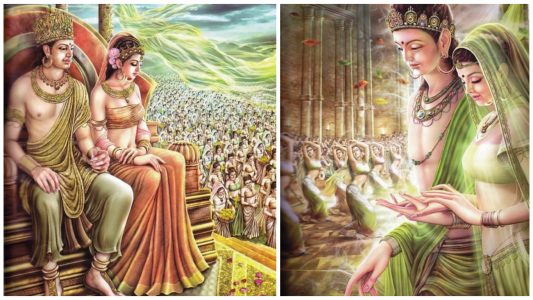Summary: Gopa (also known as Yasodhara) of the Sakya, daughter of Dandapani was found to be beautiful, wise, and full of grace. Believing her perfections to be exaggerated by his servant, the king went to meet her himself. Gopa’s father would not consent to their marriage without the prince first passing tests of skill, strength and intellect. When both were proven to be superior in all things, and matched equals, Gopa and Siddartha were married.
Excerpts from Life of Buddha, Chapter 7. The Marriage of Siddhartha
He thought of the qualities he would value most highly in a woman. Then, on the seventh day, he returned to his father. “Father,” said he, “she whom I shall marry must be a woman of rare merit. If you find one endowed with the natural gifts I shall enumerate, you may give her to me in marriage.”
And he said: “She whom I shall marry will be in the bloom of youth; she whom I shall marry will have the flower of beauty; yet her youth will not make her vain, nor will her beauty make her proud. She whom I shall marry will have a sister’s affection, a mother’s tenderness, for all living creatures. She will be sweet and truthful, and she will not know envy. Never, not even in her dreams, will she think of any other man but her husband. She will never use haughty language; her manner will be unassuming; she will be as meek as a slave. She will not covet that which belongs to others; she will make no inconsiderate demands, and she will be satisfied with her lot. She will care nothing for wines, and sweets will not tempt her. She will be insensible to music and perfume; she will be indifferent to plays and festivals. She will be kind to my attendants and to her maidens. She will be the first to awaken and the last to fall asleep. She whom I shall marry will be pure in body, in speech and in thought.”
And he added: “Father, if you know a maid who possesses these qualities, you may give her to me in marriage.”
[…]
On the day designated, all those who claimed to be skillful in the arts or in the sciences appeared at the palate. Dandapani was present, and he promised his daughter to the one, whether of noble or of humble birth, who would be victorious in the contests which were to take place.
First, a young man, who knew the rules of writing, sought to challenge the prince, but the learned Visvamitra stepped before the assembly and said: “Young man, such a contest would be futile. You are already defeated. The prince was still a child when he was placed in my care; I was to teach him the art of writing. But he already knew sixty-four varieties of script! He knew certain varieties that were unknown to me even by name!” Visvamitra’s testimony was enough to give the prince a victory in the art of writing.
[…}
Arjuna gave him the most intricate problems, and never once was Siddhartha at a loss for the correct solution. They all marvelled at his knowledge of mathematics and were convinced that his intelligence had probed to the bottom of all the sciences. They then decided to challenge his athletic skill, but at jumping and at running he won with little effort, and at wrestling he had only to lay a finger upon his adversary, and he would fall to the ground.
Then they brought out the bows, and skillful archers placed their arrows in targets that were barely visible. But when it came the prince’s turn to shoot, so great was his natural strength that he broke each bow as he drew it. Finally, the king sent guards to fetch a very ancient, very precious bow that was kept in the temple. No one within the memory of man had ever been able to draw or lift it. Siddhartha took the bow in his left hand, and with one finger of his right hand he drew it to him. Then he took as target a tree so distant that he alone could see it. The arrow pierced the tree, and, burying itself in the ground, disappeared. And there, where the arrow had entered the ground, a well formed, which was called the Well of the Arrow.
Everything seemed to be over, and they led toward the victor a huge white elephant on which, in triumph, he was to ride through Kapilavastu. But a young Sakya, Devadatta, who was very proud of his strength, seized the animal by the trunk and, in fun, struck it with his fist. The elephant fell to the ground. The prince looked reprovingly at the young man and said: “You have done an evil thing, Devadatta.”
He touched the elephant with his foot, and it stood up and paid him homage. Then they all acclaimed his glory, and the air rang with their cheers. Suddhodana was happy, and Dandapani, weeping with joy, exclaimed:
“Gopa, my daughter Gopa, be proud to be the wife of such a man.”
At that time, Dandapani a Sakya gave in marriage his own daughter, Gopa, herself a Sakya girl, to the future Buddha. King Suddhodana had already seen that that princess was special enough for his son, the future Buddha.
After the marriage was consummated, Gopa was consecrated crown princess and she was recognized as superior to all the many thousands of women who also lived inside the women’s quarters of the royal inner city.
No matter who she was with, the Sakya girl Gopa never covered her face or mouth; not when she was with her mother-in-law, nor with her father-in-law, nor with anyone inside the royal inner city. People ruminated over her as they went about their business, thinking, “A young woman who is a new wife should be unassuming and keep back, but this one thinks she’s special and is up front all the time.” When Gopa heard the crude things said about her, she spoke these verses, standing in front of all the people of the royal inner city:
The one not ordinary shines out in the open,
whether sitting, standing, or walking,
Like a glistening gem on top of a parade flagpole,
its gleaming light the first thing seen.
2
Going or coming, someone not ordinary always shines,
standing or sitting, the one not ordinary shines everywhere.
Making a sound– shining,
silent–also shining,
the one not ordinary is like
the kalavinka bird in looks and sounds.
Someone may wear rough grass made into clothes,
be dressed in threadbare rags, he may be skin and bones,
but if he is virtuous and is adorned with virtues
he shines from within with an intense brightness all his own.
All told, the one not ordinary shines, evil doesn’t exist for him,
while the fool who does evil never shines no matter what he puts on.
There are some who speak sweet words but their hearts are foul,
like a pot of poison sprinkled on top with a tincture that wards off death;
they have hearts as hard as the stone inside rocks
and just as rough to the touch;
even the sight of anyone like that repulses, like seeing a snake.
Those not ordinary refresh, gentle as cool moonlight,
all those who come and bend before them;
they are as welcoming as a shallow river ford to every living thing;
Those not ordinary are like
a pot filled with fresh milk and buttermilk;
just to see people like that, their insides so pure,
is to see a visible sign of an invisible grace.
Those who have chased away evil friends
are ever-surrounded by gems in the form of beautiful friends;
anyone who rejects sin and enters into the teaching of the Buddha
is beneficial, a visible sign of an invisible grace.
Why cover the face or mouth of anyone
who has no bodily flaws because of a guarded body,
who never speaks heedlessly because of a guarded mouth,
whose senses are guarded and whose mind is clear and still?
3
Anyone can cover themselves with a thousand cloths,
but if when their minds are uncovered,
there is neither shame nor modesty,
neither virtues nor truthful speech,
don’t they wander the world more naked than the naked?
Why cover the face or mouth of anyone
whose mind is guarded, whose senses are always in check,
someone who is happy with her own husband,
without a mind that goes after others,
who shines out in the open, just like the sun and the moon?
Moreover,
Sages, mahatmas,
those who are skilled in knowing the thoughts of others,
and those in the assemblies of gods,
they all know my hopes and wishes;
as long as my morality, my virtue, my restraint,
my carefulness are highly-esteemed by them,
why would I cover my face with a veil?

GOPA had awakened in the deep of night. A strange uneasiness possessed her. She called to her beloved, Prince Siddhartha, but there was no answer. She rose. She ran through the halls of the palace; he was nowhere to be found. She became frightened. Her maidens were asleep. A cry escaped her lips:
“Oh, wicked, wicked! You have betrayed me! You have allowed my beloved to escape!”
The maidens awoke. They searched every room. There was no longer any doubt: the prince had left the palace. Gopa rolled on the ground; she tore her hair, and her face bore the marks of her deep despair.
“He once told me that he would go away, far away, he, the king of men! But I never thought the cruel parting would come so soon. Oh, where are you, my well-beloved? Where are you? I can not forget you, I, who am forlorn, so forlorn! Where are you? Where are you? You are so beautiful! Your beauty is unrivalled among men. Your eyes sparkle. You are good, and you are beloved, my well-beloved! Were you not happy? Oh, my dear, my beloved, where have you gone?”
Song of Solomon 3
- By night on my bed I sought him whom my soul loveth: I sought him, but I found him not.
- I will rise now, and go about the city in the streets, and in the broad ways I will seek him whom my soul loveth: I sought him, but I found him not.
- The watchmen that go about the city found me: to whom I said, Saw ye him whom my soul loveth?
- It was but a little that I passed from them, but I found him whom my soul loveth: I held him, and would not let him go, until I had brought him into my mother’s house, and into the chamber of her that conceived me.
- I charge you, O ye daughters of Jerusalem, by the roes, and by the hinds of the field, that ye stir not up, nor awake my love, till he please.









